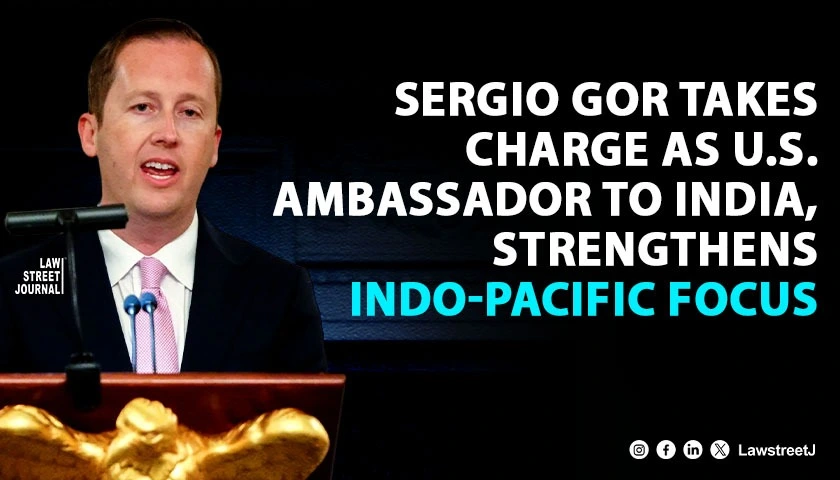United States: Sergio Gor was formally sworn in as the United States Ambassador to India on 10 November 2025 during a ceremony at the Oval Office. Vice President J.D. Vance administered the oath, with President Donald Trump present for the event. Gor will also serve as Special Envoy for South and Central Asian Affairs — a dual assignment that highlights the administration’s focus on the Indo-Pacific region. His appointment was confirmed by the U.S. Senate in October. Gor’s nomination was put forward in August 2025.
Before his selection, he served as Director of Presidential Personnel at the White House, following senior advisory positions during the Trump 2020 and 2024 campaigns. His confirmation proceeded through the Senate Foreign Relations Committee, where he outlined plans to expand cooperation between Washington and New Delhi. The full Senate later approved the nomination in accordance with Article II, Section 2 of the Constitution, which requires Senate consent for ambassadorial posts.
His appointment follows statutory requirements set by the Foreign Service Act of 1980. Under this framework, ambassadors represent U.S. interests abroad, manage diplomatic outreach, and oversee embassy operations. The special envoy role adds responsibility for coordinating regional initiatives across South and Central Asia.
Priorities and Strategic Framework
Speaking at the ceremony, President Trump emphasized that Gor’s mission centers on strengthening strategic, economic, and security ties with India. The two countries have expanded cooperation across multiple sectors in recent years. Data from the U.S. Trade Representative shows that bilateral trade in goods and services reached 192 billion dollars in 2024, placing India among the United States’ top trading partners.
The current partnership draws support from several existing agreements, including the U.S.-India Defense Technology and Trade Initiative, which supports joint development of defense projects; the 2016 Logistics Exchange Memorandum of Agreement, providing reciprocal access to military facilities; and the Initiative on Critical and Emerging Technology, launched in 2023 to promote collaboration in areas such as artificial intelligence, quantum technologies, and semiconductors.
Ongoing policy discussions include negotiations on a bilateral investment treaty and work on digital trade rules and intellectual property protections. The State Department identifies India as a key partner in regional stability and counterterrorism efforts — factors that shape the broader diplomatic agenda.
Regional Scope and Policy Implications
India’s Ministry of External Affairs welcomed the appointment, noting the continuity of strategic dialogue between the two countries. Previous exchanges between Prime Minister Narendra Modi and President Trump have underscored a commitment to what both leaders describe as a comprehensive global strategic partnership — a framework first outlined in their 2020 joint statement.
Gor’s second designation as Special Envoy for South and Central Asia gives him responsibility for coordinating U.S. engagement in countries including Afghanistan, Bangladesh, Nepal, and Sri Lanka. His work will involve regional security consultations, development programs, and diplomatic outreach consistent with U.S. foreign policy priorities. The appointment may also help shape the next phase of defense and regulatory cooperation.
Legal analysts point to the U.S.-India Civil Nuclear Agreement of 2008, enacted under Section 123 of the Atomic Energy Act, as a cornerstone of long-term energy collaboration. They note that the agreement could see additional progress during Gor’s tenure.
The U.S. Embassy in New Delhi is expected to focus on visa processing efficiency, education partnerships, and consular services. According to the Department of Homeland Security, Indian nationals represented more than 17 percent of all H-1B visa holders in 2024, making immigration policy a key point of engagement.









